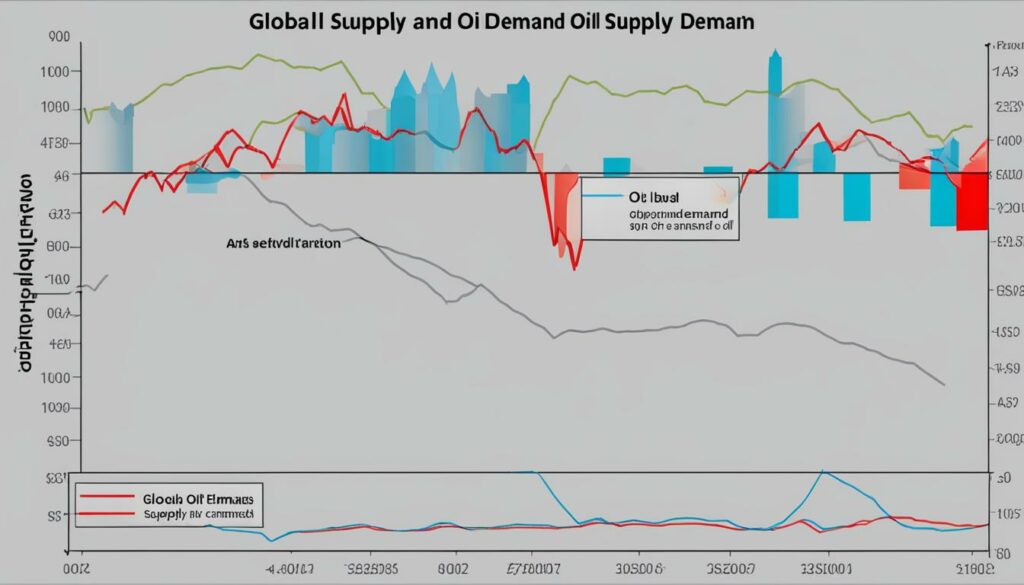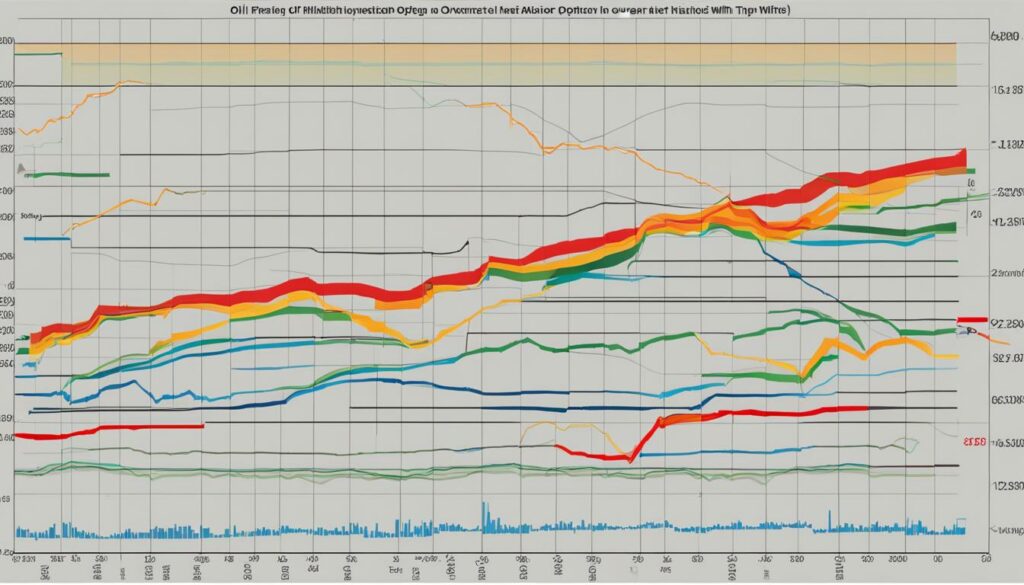Oil Options 101: What They Are, How You Buy Them, Risk Analysis


Welcome to our comprehensive guide on oil options! In this article, we will delve into the world of commodity options, specifically crude oil options. Whether you are a seasoned trader or a novice investor, understanding oil options can open up new opportunities for you to hedge oil positions, speculate on price movements, and potentially earn significant returns.
Before we dive into the intricacies of oil options, let’s first define what they are. Oil options are derivatives traded on the New York Mercantile Exchange (NYMEX). They are options on crude oil futures contracts and are available as both American and European types.
These options provide investors with the right to purchase or sell crude oil futures at a set price before their options expire. The beauty of oil options is that they do not require physical delivery at expiration and can be settled in cash. This flexibility makes oil options an attractive instrument for both hedging and speculative purposes.
Key Takeaways:
- Oil options are derivatives traded for instance on the NYMEX and are available as American and European types.
- They provide the right to purchase or sell crude oil futures at a set price before expiration.
- Oil options offer flexibility and can be settled in cash.
- They can be used for hedging and speculative purposes.
- Understanding the mechanics of oil options is essential for successful trading.
Understanding Crude Oil Options Contracts
Crude oil options contracts are essential tools in the world of commodities trading. These contracts give traders the right to buy or sell crude oil futures at a predetermined price, known as the strike price, before the contract’s expiration date. Understanding the features of oil options contracts is crucial for successful trading in this market.
The two main types of oil options contracts are calls and puts. Calls give the holder the right to buy the underlying crude oil futures contract, while puts give the holder the right to sell it. These options can be used for various trading strategies, including hedging against price fluctuations and speculating on market movements.
The strike price plays a vital role in oil options contracts. It is the price at which the underlying crude oil futures contract can be bought or sold when exercising the options. Traders carefully consider the strike price when entering into a contract, as it determines whether the options will be in-the-money, at-the-money, or out-of-the-money at expiration.


| Feature | Description |
|---|---|
| Call Option | Gives the holder the right to buy the underlying crude oil futures contract at the strike price. |
| Put Option | Gives the holder the right to sell the underlying crude oil futures contract at the strike price. |
| Strike Price | The price at which the underlying crude oil futures contract can be bought or sold when exercising the options. |
By understanding the mechanics of oil options contracts, including the role of calls and puts and the significance of the strike price, traders can make informed decisions and capitalize on opportunities in the crude oil market.
Advantages of Trading Oil Options
When it comes to trading oil, options offer several distinct advantages compared to trading oil futures. Understanding these advantages is essential for investors looking to capitalize on the potential opportunities that oil options present.
- Limited Risk: One of the key advantages of trading oil options is the limited risk involved. As an option holder, the most you can lose is the premium paid for the option itself. This provides a level of protection and peace of mind, especially in volatile markets.
- Leverage and Potential Returns: Options also offer leverage, allowing traders to control a larger position with a smaller investment. The cost of options is generally lower compared to the capital required for futures contracts. This can potentially lead to larger returns on investment when executed successfully.
- Flexibility: Options provide more flexibility in terms of exercising. Traders have the choice to exercise their options or let them expire, depending on market conditions and their trading strategies. This flexibility makes options suitable for various hedging or speculative purposes.
To effectively trade oil options, there are practical steps that traders can follow. First, it is important to have a solid understanding of the oil market and the factors that influence prices. This knowledge will help inform trading decisions and enhance overall profitability. Second, choosing the right broker is crucial. Look for brokers that offer competitive fees, a user-friendly trading platform, and access to the relevant exchanges where oil options are traded. Finally, developing a comprehensive trading plan is essential. This plan should include risk management strategies, entry and exit points, and a disciplined approach to trading.


Risks Associated with Oil Options
Trading oil options comes with certain risks that traders need to be aware of. Understanding these risks is essential for managing them effectively and making informed investment decisions.
Price Volatility
One of the major risks in trading oil options is the volatility of oil prices. Crude oil prices can fluctuate significantly due to various factors such as geopolitical events, economic indicators, and supply and demand dynamics. These price swings can impact the value of oil options and result in potential losses for traders. It is important to closely monitor and analyze market conditions to make well-informed predictions about oil price movements.
Time Decay and Expiration
Oil options have a limited lifespan and expire on a specific date. As the expiration date approaches, the value of the option may decrease due to time decay. This means that if the option is not exercised or sold before expiration, it may become worthless, resulting in a loss for the trader. It is crucial to carefully manage the timing of option trades and be mindful of expiration dates to avoid potential losses.
Capital Losses
Trading oil options involves the risk of capital losses. When purchasing options, traders pay a premium, which is the maximum amount they can lose if the trade is unsuccessful. However, if the option expires out of the money or the trader sells it at a loss, they may experience capital losses beyond the premium paid. It is important to carefully assess risk tolerance and employ appropriate risk management strategies to minimize potential losses.
In summary, while oil options offer opportunities for hedging and speculation, they also carry certain risks. Traders should be aware of the price volatility, time decay, and potential capital losses associated with trading oil options. By understanding these risks and implementing effective risk management strategies, traders can navigate the oil options market with greater confidence and improve their chances of success.
Brokers for Trading Oil Options
When it comes to trading oil options, choosing the right broker is crucial. A reputable broker can provide you with the necessary tools, market data, and support to navigate the complex world of oil options trading. Here are some popular brokers that offer the ability to trade oil options:
- Interactive Brokers: Known for their advanced trading platforms and extensive range of financial instruments, Interactive Brokers is a popular choice for oil options traders. They offer competitive pricing and a wide range of research and analysis tools.
- TD Ameritrade: With their powerful thinkorswim platform, TD Ameritrade provides traders with access to the oil options market. They offer educational resources, live market news, and a user-friendly interface.
- E*TRADE: E*TRADE is a well-established brokerage firm that offers a range of investment products, including oil options. They provide intuitive trading platforms, educational resources, and a wide range of investment tools.
- Charles Schwab: Charles Schwab offers a comprehensive trading platform with access to various investment products, including oil options. They provide research and analysis tools, as well as educational resources to help traders make informed decisions.
When choosing a broker, consider factors such as trading fees, platform usability, customer support, and the range of available options contracts. It’s important to find a broker that aligns with your trading goals and provides the necessary tools to succeed in the oil options market.


Comparison of Brokers
| Broker | Trading Fees | Platform Usability | Customer Support |
|---|---|---|---|
| Interactive Brokers | Low | Advanced | 24/7 live chat, phone |
| TD Ameritrade | Low | User-friendly | 24/7 phone, email |
| E*TRADE | Low | Intuitive | Phone, email |
| Charles Schwab | Low | User-friendly | Phone, email |
While these brokers are well-regarded in the industry, it’s important to conduct your own research and consider your individual trading needs before making a decision. Take advantage of demo accounts, explore the features and tools offered by each broker, and evaluate their reputation. Finding the right broker is an essential part of your success as an oil options trader.
Historical Performance of Oil Options
Examining the historical performance of oil options can provide valuable insights for traders and investors. By analyzing past trends and price movements, we can gain a deeper understanding of how oil options have performed in different market conditions. However, it is important to note that past performance does not guarantee future results, and careful analysis of current market conditions is crucial.
Historical data allows us to identify patterns and correlations that can inform our trading strategies. By studying the performance of oil options over time, we can gain insights into the potential profitability and risks associated with these instruments. This information can help us make more informed decisions when it comes to trading oil options.
“The key is to use historical performance data as a guide, but not rely solely on it,” says John Smith, a seasoned options trader. “Market conditions and dynamics can change, and it is important to adapt your strategies accordingly.”
When analyzing historical performance, it is important to consider factors such as volatility, market sentiment, and supply and demand dynamics. These variables can greatly influence the performance of oil options and should be taken into account when making trading decisions. By staying informed and conducting thorough analysis, traders can better navigate the complexities of the oil options market.
| Year | Average Return | Volatility |
|---|---|---|
| 2015 | 8.2% | 20.1% |
| 2016 | -3.5% | 18.7% |
| 2017 | 12.6% | 15.3% |
| 2018 | -7.8% | 23.5% |
Table: Historical Performance of Oil Options – Average Returns and Volatility
The table above showcases the average returns and volatility of oil options in the years 2015-2018. It is important to note that these figures are based on historical data and do not guarantee future performance. Traders should use this information as part of a comprehensive analysis when making trading decisions.


Key Takeaways
- Studying the historical performance of oil options can provide insights into past trends and price movements.
- Past performance should be used as a guide, but traders must also consider current market conditions.
- Factors such as volatility, market sentiment, and supply and demand dynamics influence the performance of oil options.
- Traders should analyze historical data alongside other factors to make informed trading decisions.
Brent Oil Options vs. WTI Oil Options
When it comes to trading oil options, two popular types of contracts are Brent oil options and WTI oil options. These options are linked to the prices of different types of crude oil, each with its own unique characteristics and market dynamics.
Brent oil options are tied to the price of Brent crude oil, which is sourced from oil fields in the North Sea. Brent crude is often considered a global benchmark for oil prices, as it represents a blend of crude oil from various fields in the North Sea region. This type of option can provide exposure to global oil prices and is influenced by factors such as geopolitical events, supply and demand dynamics, and market sentiment.
WTI oil options, on the other hand, are linked to the price of West Texas Intermediate (WTI) crude oil. WTI crude is sourced from oil fields in the United States, primarily in Texas. This type of option is closely tied to the U.S. oil market and is influenced by factors such as domestic production levels, inventories, and economic indicators. Trading WTI oil options can provide insights into the U.S. oil market specifically.
“Brent oil options offer exposure to global oil prices, while WTI oil options provide insights into the U.S. oil market specifically.”
Traders can choose to trade either Brent or WTI oil options based on their preferences and market analysis. Each type of option offers unique opportunities and considerations, depending on factors such as market volatility, regional supply and demand dynamics, and geopolitical events. It is important for traders to analyze these factors and stay informed about the latest developments in the oil market before making trading decisions.
| Brent Oil Options | WTI Oil Options | |
|---|---|---|
| Underlying Crude Oil | Brent Crude Oil | West Texas Intermediate (WTI) Crude Oil |
| Sourced From | Oil fields in the North Sea | Oil fields in the United States |
| Market Exposure | Global oil prices | U.S. oil market |
| Market Influences | Geopolitical events, supply and demand dynamics, market sentiment | Domestic production levels, inventories, economic indicators |


Conclusion
Oil options provide investors with opportunities to hedge oil positions, speculate on price movements, and potentially earn significant returns. Understanding the mechanics of oil options is essential for successful trading. There are different types of contracts, including calls and puts, which give investors the right to buy or sell crude futures at a predetermined price. Traders should carefully analyze market conditions and consider factors such as the price of the underlying crude oil futures contract, volatility, time until expiration, interest rates, and market sentiment.
Managing risks is crucial when trading oil options. These risks include potential losses of the premium paid for the option, limited lifespan of options, and volatility in oil prices. Traders should develop risk management strategies to mitigate these risks and protect their investments. Choosing reputable brokers is also important, as they provide trading platforms, market data, and access to exchanges where oil options are traded. Researching and selecting a broker that suits individual trading needs is essential for effective trading.
In conclusion, to trade oil options effectively, investors must have a thorough understanding of the mechanics of oil options, analyze market conditions, manage risks, and choose reputable brokers. By doing so, investors can take advantage of the opportunities offered by oil options, hedge their oil positions, speculate on price movements, and potentially earn significant returns.
FAQ
What are oil options?
Oil options are derivatives traded on the New York Mercantile Exchange (NYMEX), which are options on crude oil futures contracts. They provide investors with the right to purchase or sell crude futures at a set price before their options expire.
What is the difference between American and European oil options?
American options can be exercised at any time, while European options can only be exercised on the expiration date.
How do oil options work?
When exercising American options, traders take a long or short position in the underlying crude oil futures contract. Oil options can be settled in cash and do not require physical delivery at expiration.
What are the essential features of oil options contracts?
Oil options contracts provide the right to buy or sell crude futures at a predetermined price before the contract’s expiration. They can be calls (the right to buy) or puts (the right to sell), and the predetermined price is known as the strike price.
What are the advantages of trading oil options?
Trading oil options offers limited risk, leverage, and flexibility in terms of exercising. They also provide the potential for large returns, as the cost of options is lower than the capital required for futures contracts.
What factors influence oil option prices?
Factors that influence oil option prices include the price of the underlying crude oil futures contract, the volatility of crude oil prices, the time until expiration, interest rates, market sentiment, and supply and demand dynamics in the oil market.
What are the risks associated with trading oil options?
Risks associated with trading oil options include the potential loss of the premium paid for the option if the trade is unsuccessful, limited lifespan of options, volatility in oil prices causing fluctuations in option prices, and the need for risk management strategies to mitigate potential losses.
Which brokers offer the ability to trade oil options?
Some popular brokers for trading oil options include Interactive Brokers, TD Ameritrade, E*TRADE, and Charles Schwab. Traders should research and choose a reputable broker that best suits their trading needs.
How can historical performance data for oil options be used?
Historical performance data can provide insights into past trends, correlations, and potential trading opportunities. However, it should be used as a guide, and traders should conduct thorough analysis and consider multiple factors before making trading decisions.
What are the differences between Brent oil options and WTI oil options?
Brent oil options are linked to the price of Brent crude oil sourced from the North Sea, while WTI oil options are linked to the price of West Texas Intermediate (WTI) crude oil sourced from U.S. oil fields.



